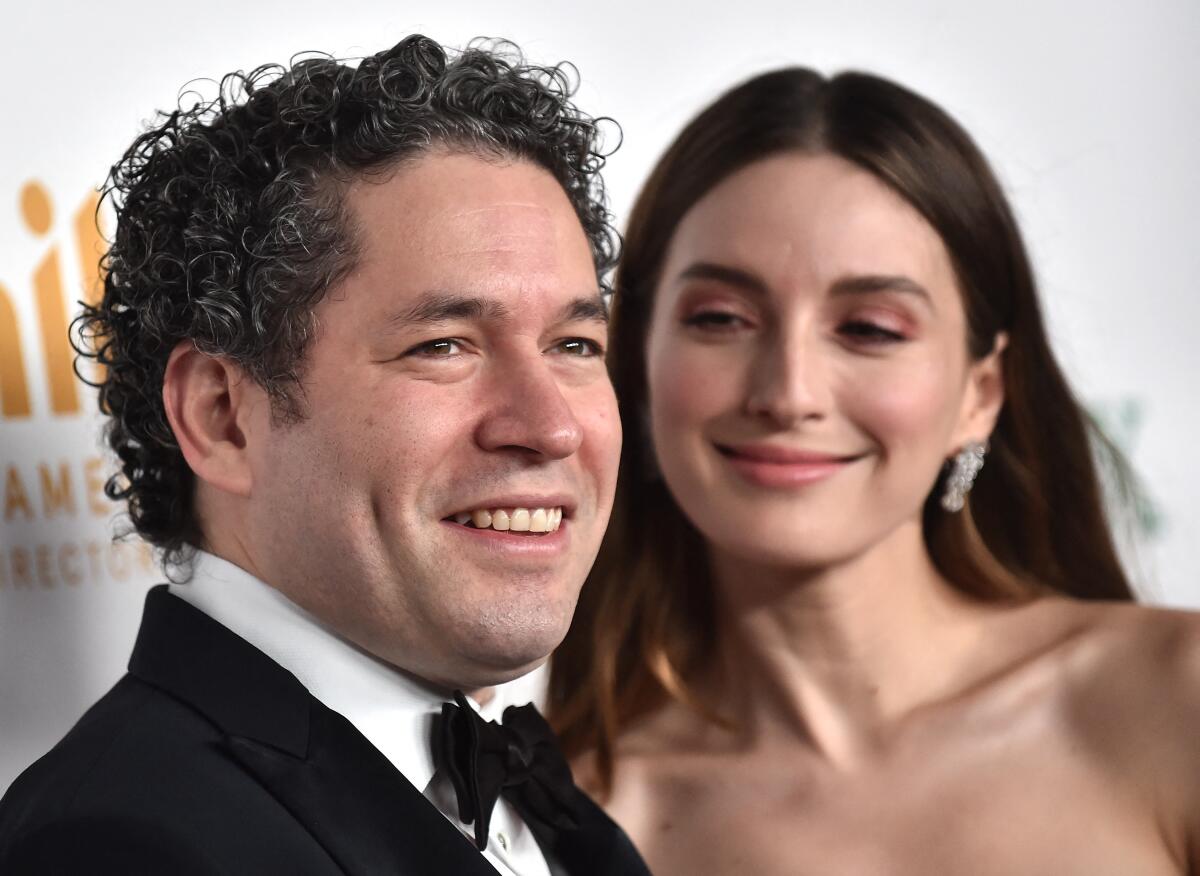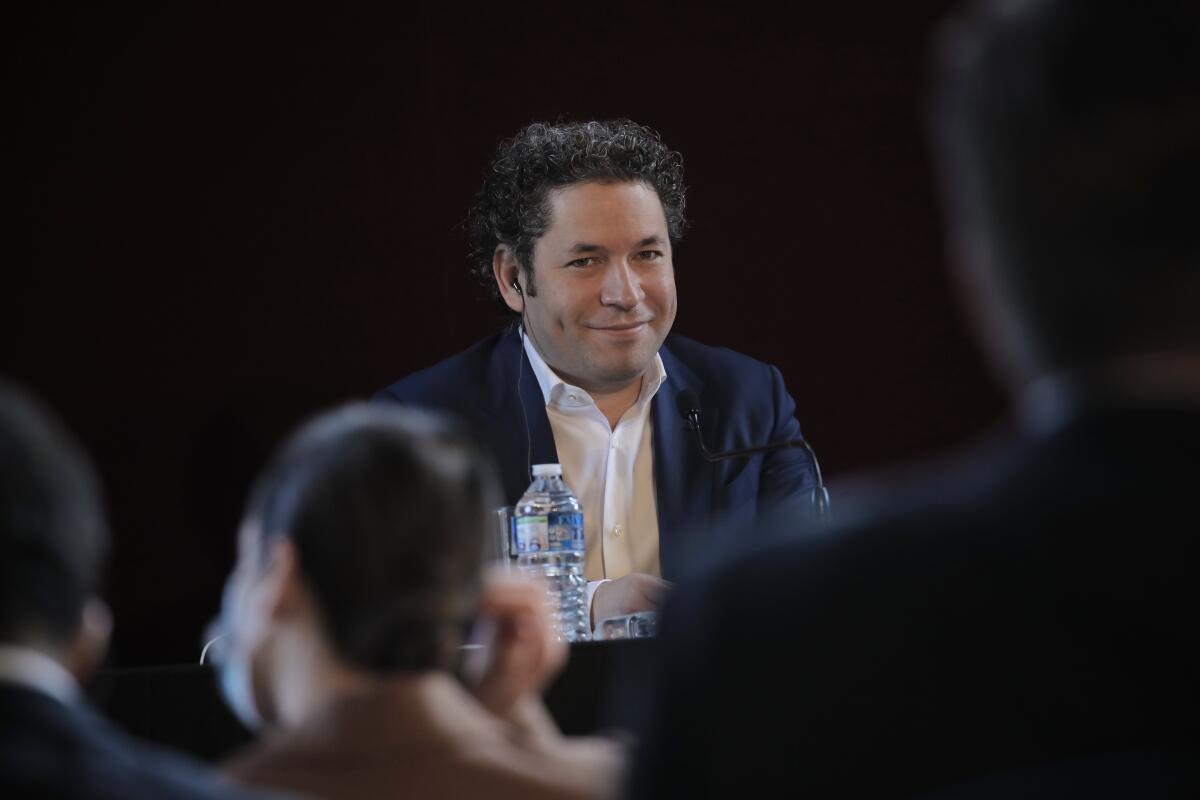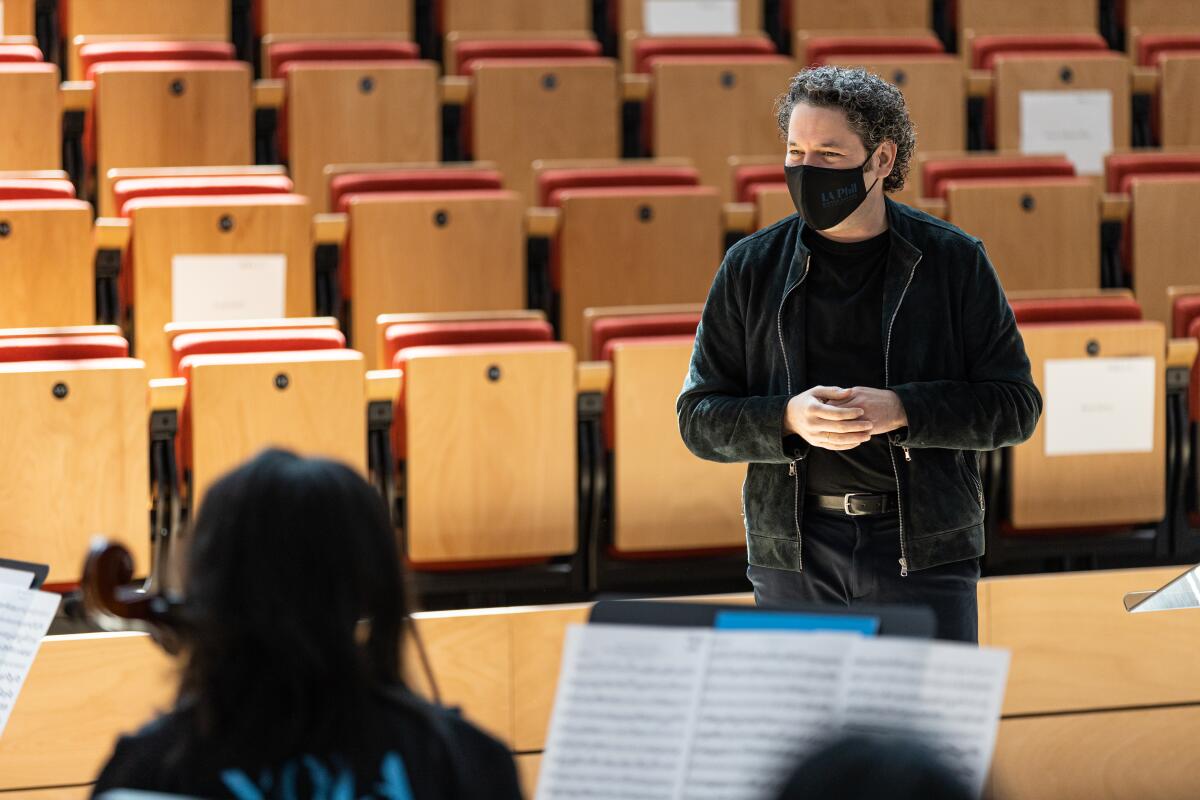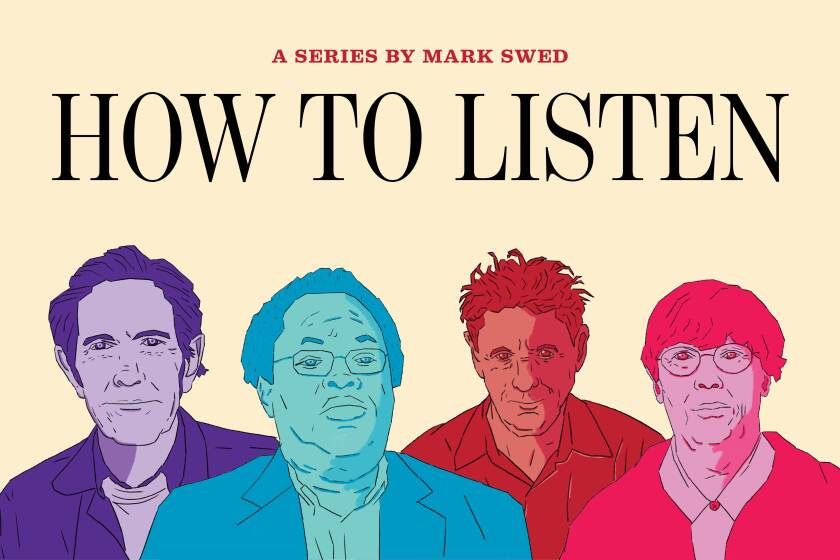For Dudamel, the trauma of COVID-19 turned personal: ‘I am not the Gustavo of 2010’
All summer at the Hollywood Bowl, Gustavo Dudamel showed signs of a new gravitas. Despite the vagaries of the amphitheater, with its typically limited rehearsal time and easily distracted audiences, the Los Angeles Philharmonic displayed in his performances a singular urgency. No note was left to evaporate without consequence in the placid summer air.
But the full realization that something is up had to wait until the season opening gala at Walt Disney Concert Hall, where the orchestra hadn’t played in the flesh for the public in 19 months. In the Bowl, the excellently amplified L.A. Phil was attention getting and immersive. In the natural acoustic of Disney this month, the startling sound of the orchestra turned nuclear.
Five days after the gala, on the day the L.A. Phil began its regular season in the hall, I met with Dudamel after morning rehearsal in the small garden adjoining his office and dressing room. I asked him what was going on.
“We were here doing the ‘Power to the People!’ festival, and people were talking about something that was happening in Europe,” he said. “Then came the cancellations. I remember hearing that they would be a few days. Then the virus was supposed to go away in a few months, and I would do my tours. It didn’t happen.
“And then you say, ‘My God, how do we digest all this?’ There is no question that, for all of us, whether or not you lost family or friends, this was a trauma.”
Dudamel did lose family and friends. His trauma proved life-changing.
His has been, for as long as he can remember, a life of orchestras. As a little boy in his hometown — Barquisimeto, Venezuela — he began playing violin in a children’s orchestra that was part of Venezuela’s El Sistema education program. He took up conducting in his early teens. He had never, for a second, stopped.
Dudamel had been thinking about taking a sabbatical just before one was unexpectedly forced upon him, turning his world upside down and challenging his engrained optimism. He lost to COVID-19, he said, some of his closest family in Venezuela, including his grandmother, who helped to raise him.
The world in which he lived instantly vanished. “Before, I knew that I had a concert the next day and then the next day,” he said. “I was always trying to avoid routine, but you get in a routine; you can’t help that.”
There was the compensation of being home with his wife, Spanish actress María Valverde, and his son, Martín. Dudamel cooked breakfast. He cleaned. Meanwhile, his goal became to keep the L.A. Phil going. He jumped in full time to find financial support for the world’s most ambitious orchestral institution and the largest, which faced an incomprehensibly enormous loss of revenue that could reach $100 million.
“I had to make calls every day talking to donors,” he recounted. “I did that before, but most of my job was musical.”
He took on unfamiliar roles, first by hosting a radio series on KUSC speaking with musicians to whom he is close. He also hosted a TV series for PBS from the Hollywood Bowl, which was followed by a series of streamed concerts filmed on the Bowl stage, without an audience and with an orchestra that was distanced and masked when possible. When not possible, the winds and brass played behind plastic barriers.

“Doing this was a discovery for me, completely new,” Dudamel explained. “I had to learn how to go back to the Hollywood Bowl.” Essential COVID safety precautions, while a challenge for conductors and orchestra musicians everywhere, proved especially discombobulating for Dudamel. His training in Venezuela was in huge children’s orchestras, hundreds strong, the players packed so close together that the strings had to choreograph their bowing to prevent poking one another’s eyes out.
“But I think that is what makes you more mature,” Dudamel said. “You learn the complete package, what it means to have a family at home or with the orchestra and to really take care of every single part of that. It had never been like that for me.”
Before the pandemic, his primary responsibilities with the L.A. Phil were music making and artistic direction. With the shutdown, he said, the responsibility became a requisite. “It was a need to find a way. A need to have a plan. And that was also a great discovery for me.
Coronavirus may have silenced our symphony halls, taking away the essential communal experience of the concert as we know it, but The Times invites you to join us on a different kind of shared journey: a new series on listening.
“I found a new dimension as a human being — learning, connecting, doing things that I was not before expected to do. I had always found it wonderful to connect with people that I knew, but this time I went much more deeply in my relations with people. It’s a different place that I’m in right now that I feel gives me a completely different sense about how I make music.”
In the end, Dudamel said, it all boils down to the essentials of “to be born and to die.”
“Everything can be the last time. How you do that, how you are, how you create, how you interpret music, all of that goes deeply into your being.”
Still, Dudamel said he was prepared, that a change had already started for the conductor, who turned 40 during the pandemic.
“I am not the Gustavo of 2010, 2011, 2012, when I was guest conducting everywhere,” he said, noting how he has cut back on guest conducting in recent years.
“I believe I lead a simple life — a simple, normal and beautiful life,” he said. “These days, now that Martín has started school, we wake up at 6:15, prepare his lunch and I take him to school.
“I’m not a person who wants an entourage. I love to drive. I love to cook. For example, sometimes after I’ve finished a concert, we go home, and I cook for six or eight people. We stay up eating and drinking and talking. That is what makes my life rich.”
Which is not to say that Dudamel’s idea of slowing down isn’t relative. He may have been slower than many other conductors to emerge in the early months of the pandemic, as he took time to process grief, to brainstorm with his L.A. Phil team and to cook. But by summer 2020, he was leading the Vienna Philharmonic at the Salzburg Festival. Over the following year he conducted in Germany, the Netherlands and Spain, where concert life remained more open than in the U.S.
This summer he became music director of the Paris Opera, which will share the conductor with the L.A Phil. Not only does this put Dudamel at the center of artistic life in the French capital, but it also is another full-time job by itself in a vast institution that mounts opera and ballet year-round in its two opera houses and that sponsors an education project.

In Paris, Dudamel intends to conduct opera, dance and orchestral concerts while expanding the range of all three, along with education. He envisions a new and close relationship between the Paris and the L.A. institutions that will include sharing opera productions, bringing the Paris company to the Music Center for opera and dance, and expanding the opera repertory in Paris to include composers whom he champions with the L.A. Phil, in particular John Adams and Thomas Adès. Naturally, he will bring members of his beloved YOLA to Paris to work with French youth. He also wants mega-orchestra concerts with players from both his Paris and L.A. orchestras. He’s building one big (make that gigantic) family.
Dudamel hasn’t ceased for a second his involvement with El Sistema. He may be politically persona non grata in Venezuela, but he keeps in daily touch with the Sistema administration, and he mentors young Venezuelan musicians virtually. As heartbreakingly disastrous as living conditions have become in the country, Dudamel said the program continues to receive support, and nearly a million kids are in it.
Given all that, it may be difficult to see how Dudamel has time for reflection. But he pointed out that, instead of running around the world, he increasingly will stay put — either in L.A., which he continues to call his home, or in Paris.
One of the ways he connects the two will be through Wagner. He will bring back to both cities the “Tristan Project,” first given by Esa-Pekka Salonen with video by Bill Viola and staged by Peter Sellars. It originally was a joint production between the L.A. Phil and Paris Opera.
“People told me, ‘Be careful with “Tristan”; it can become an obsession,’” Dudamel said. Sure enough, “It’s my obsession.”
It doesn’t stop there. Dudamel spent much of the pandemic with Wagner’s “Ring.” He’d like to find a way to do that as a joint project too.
But where Dudamel may have changed the most, and where his new simplicity may most affect his music making, is his pandemic pastime of reading scores for the sheer pleasure of it. He had his Scotch, his cigar, his chair and his score, he said, and he simply let the music stimulate his imagination. “I didn’t have to analyze, get to the core of the structure and consider an interpretation. I could just be in the moment with the music.
“And that is exactly the way I started to love music. It was desire. It was pleasure. It was genuine love.”
It is this, Dudamel believes, that makes everything that had been lost in the last year and a half seem so different. He said he feels as though something in the atmosphere is bringing him and orchestra together in a new way. Being back in Disney Hall, he finds the orchestra members instinctively wanting to sit closer to one another than they ever had.
Dudamel’s opening-night subscription concert could have been dubbed “Trauma and Transfiguration” in its representation of death-haunted reality. He began with the string orchestra version of Schoenberg’s “Transfigured Night,” a description of a couple overcoming an existential crisis in a spooky forest that was played with gripping authority.
He ended with Strauss’ “Death and Transfiguration,” a huge symphonic tone poem by a 25-year-old composer imagining the redemption of a dying artist. Here Dudamel brought overwhelming extremes of dark and light with a massive orchestra.
In between, there was no idealistic redemption, just a honey-coated hospice-care goodbye from the old, dying Strauss in his “Four Last Songs,” written a half century later. Soprano Golda Schultz provided the honey, a little Hallmark-card bland perhaps, but exceedingly beautiful.
In the fourth song, “At Sunset,” a couple walk into mystery, trying not to lose their way in solitude (as so many have this long pandemic). “Is this death?” they ask. Dudamel let it mysteriously fade, with no hint of an answer, simply the arrival of peace.
“It’s a question,” he had told me earlier. “We don’t know.”
What Dudamel did know is that the hour was getting late and he needed to drive home and cook lunch.

More to Read
The biggest entertainment stories
Get our big stories about Hollywood, film, television, music, arts, culture and more right in your inbox as soon as they publish.
You may occasionally receive promotional content from the Los Angeles Times.












